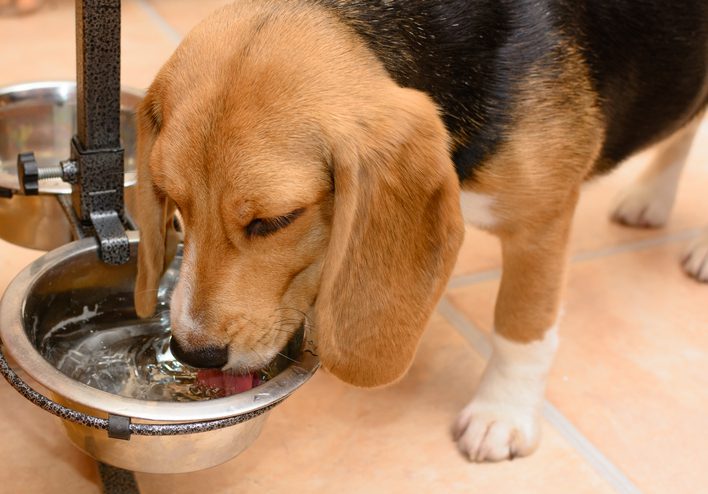How to Tell if a Dog is Dehydrated in Tulsa, OK and How to Help
Do you know how to recognize when a dog is dehydrated? Dehydration in dogs is a serious problem, and if a dog stays dehydrated for too long, it can even prove fatal. By learning how to recognize signs of dehydration in dogs and knowing how to respond to these signs, you can help protect and care for your dog better than ever before.
Read through the information below to find out more about what to look for and how to help if you suspect your dog may be dehydrated.

Symptoms of Dehydration in Dogs
Here are some symptoms your dog may show if they are dehydrated.
Lack of Elasticity in the Skin
You can hold your dog’s skin at his shoulders, pull it up gently, and watch how quickly it snaps back into place to check this symptom. If it snaps back immediately, your dog is likely not dehydrated, but if it takes a while, this means he needs fluids.
Vomiting
Vomiting may occur in dogs who are even mildly dehydrated. Unfortunately, vomiting also causes dogs to become even more dehydrated, which means the problem will quickly move from mild to severe without intervention. If your dog is dehydrated and vomiting, he needs to go to the emergency vet, as this could be a life-threatening situation.
Panting
Panting excessively may occur when your dog is dealing with moderate to severe dehydration. Mild dehydration may not always cause this symptom. If you notice your dog panting without any other explanation or if he is panting with other symptoms from this list, he needs to go to the vet as soon as possible.
Lethargy and Weakness
Lethargy and weakness are common symptoms of almost any problem your dog may deal with. Dogs may become lethargic and weak from illness, chronic pain, anxiety, and dehydration as well, among other conditions. If this symptom is associated with any others on this list, however, you may be able to assume dehydration is the cause.
Loss of Appetite
Loss of appetite is caused when a dog is so dehydrated that he doesn’t feel capable of eating anymore. It may also go along with vomiting and nausea. However, this symptom may be associated with a wide variety of other conditions in dogs and may not indicate dehydration on its own.
Dry Nose
A dry nose by itself is not an indicator of a dehydrated dog, and many dogs have dry noses for perfectly normal, benign reasons. However, if your dog has a dry nose along with any other symptoms on this list, there is a chance he is dehydrated.
Thick Saliva and Sticky Gums
Touch your dog’s gums; if they are stickier than normal or if his saliva is thicker than normal, he is likely dehydrated. Press your finger against his gums and see how long it takes the area to go from white back to pink. If it takes a long while, your dog is probably dehydrated. If not, he is likely okay.
Sunken Eyes
Sunken eyes may be an indicator that your dog is losing too much fluid too quickly.
How to Help to a Dehydrated Dog
Here are a few ways to help a dog that is dehydrated. Be sure to also call your veterinarian.
Provide Water
Provide cool, fresh water. Some dogs may recover quickly if they are given a good, fresh bowl of water in a clean dish to drink.
Offer Canned Food or Kibble Mixed with Broths
Wet canned food has a lot more water in it than kibble does, so it can be a good way to encourage your dog to get fluids in his diet. Mixing kibble with broths may encourage your dog to both eat and drink.
Electrolyte Drink
Ask your vet about giving your dog an electrolyte drink for human children. Pedialyte is one option that is often safe to give dogs with veterinary instruction.
Keep an Eye on Your Dog
Monitor your dog’s symptoms and water intake. If he drinks water and starts to improve, he should be okay, but you may want to schedule a follow-up appointment with your regular vet in a few days to be sure.
Emergency Vet
Take your pet to the emergency vet if all else fails. If your dog is not improving, will not eat or drink, or has any other symptoms at all, take him to the emergency vet. He will need IV fluids and may be very sick.
Talk with a Veterinarian
By responding appropriately to dehydration in your dog, you can help your pet feel better and may even help him survive his dehydration as well. Understand, too, that dehydration is often caused by an underlying problem and is usually a symptom rather than an illness on its own. Because of this, you’ll need to work with a vet to get to the bottom of the issue.
Your vet will examine your dog thoroughly and perform tests to help determine the cause of his dehydration. From there, the vet can recommend a treatment or management option for your pet depending on the severity of his condition.
To talk with a veterinarian at Animal Emergency Center of Tulsa about your dog’s dehydration call 918-665-0508!
